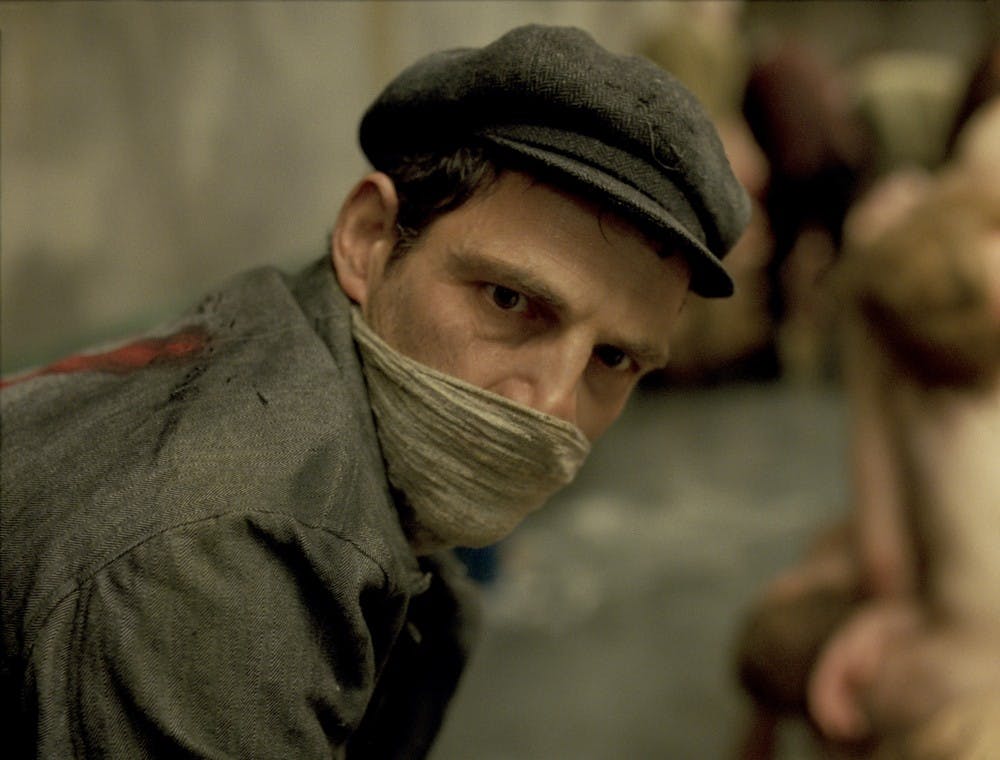Filmmakers have been attempting to bring the Holocaust to life on screen for decades with varied success. Documentaries like Alain Resnais’ “Night and Fog” and Claude Lanzmann’s “Shoah” are able to present the horrifying reality of the genocide to audiences, but narrative filmmakers have had a harder time recreating or representing what actually happened.
In recent history, no film has unflinchingly represented the reality of the Holocaust like “Son of Saul.” The 2015 Academy Award winner for Best Foreign Language Film, “Son of Saul,” or “Saul fia” as it’s called in Hungarian, stars actor Géza Röhrig as Saul Ausländer, an Auschwitz prisoner who is forced to work in the gas chambers and assist in the mass murder of his fellow Jews.
Röhrig visited the IU Cinema on Wednesday night, and following a screening of his film, he spoke about the enduring importance of Holocaust education.
Röhrig, who is an Orthodox Jew, did thorough research before adopting the role of Saul. Rather than trying to understand the character’s inner thoughts, Röhrig focused on specifics of the conditions in Auschwitz.
“These people had no thoughts and feelings,” Röhrig said. “The tasks they were doing, at all hours of the day, and the mental and physical exhaustion of their situation— it desensitized and dehumanized them. They were just living minute by minute.”
The fictional character of Ausländer in “Son of Saul” is a member of the Sonderkommando, the group of Jewish prisoners that were forced to help in the gassing and cremating of their fellow prisoners at Auschwitz. In the film, Ausländer comes across a body that he thinks is his son, and he embarks on a mission to give the body a traditional Jewish burial.
Director László Nemes worked with Röhrig to create a different kind of Holocaust movie, one that doesn’t flinch away from the most taboo topics.
“We knew this was a risky undertaking,” Röhrig said. “It raises questions of cooperation, and it raises questions of the Jewish passivity.”
Röhrig said they wanted to stay away from the usual kind of Holocaust movie, one that purposely prompts tears and gives the audience an emotional release.
“The Holocaust has been used and abused by Hollywood," Röhrig said. "It was, and is still, exploited for entertainment purposes. It has been Disney-fied."
He went on to say that Hollywood has created a sort of Holocaust genre, which often simplifies the experience for the sake of adding gravitas to a boring story.
“It’s the last resort of untalented people,” he continued. “They think the Holocaust will lend dramatic volume to their idiotic, cookie-cutter, C-rated nothing.”
Röhrig explained that, in his opinion, most Hollywood movies about the Holocaust have very little to do with the experience, with the "then and there." For that reason, Röhrig and Nemes attempted to narrow the scope of "Son of Saul" both visually and narratively.
"We didn’t want your tears. There are no tears that do justice to the murder of six million people.”
“Son of Saul” uses tight close-ups of Röhrig’s face throughout the film, which creates an intimate, immersive cinematic experience. According to Röhrig, the filmmakers stayed away from Holocaust iconography on purpose, including “the striped pajamas, the shaved heads and the tattoos.”
“We wanted to do an anti 'Schindler’s List,'" Röhrig said. "We didn’t want anyone to cry. We wanted to deliver a different sort of punch, one that stays with you longer. In order to achieve what we wanted, we had to create an experience that was visceral and immersive.”
While Röhrig spoke at length about how the Holocaust is a topic that many countries can relate to, the experience of promoting the film in Germany was different than in other countries.
“One thing is sure, I’ll just lay out the facts,” Röhrig said. “The Berlin Film Festival didn’t want our movie. It only had negative reviews in Germany. Germany didn’t buy and distribute the movie. Which is amazing, really, if you think about it. Of all the countries, Germany didn’t want any of it.”
Röhrig said he thinks Holocaust education and understanding is just as important now as it’s ever been.
“This is a permanent possibility, genocide," he said. "History has shown, to me at least, that the page is not turned. I don’t think we are living after Auschwitz, I think we are living in the times of Auschwitz.”
Despite modern waves of anti-Semitism and a new generation of Holocaust deniers, Röhrig says that he continues to have hope — but only to a certain extent.
“My hope is for the little man. I have no hopes for the leaders of the world.”




